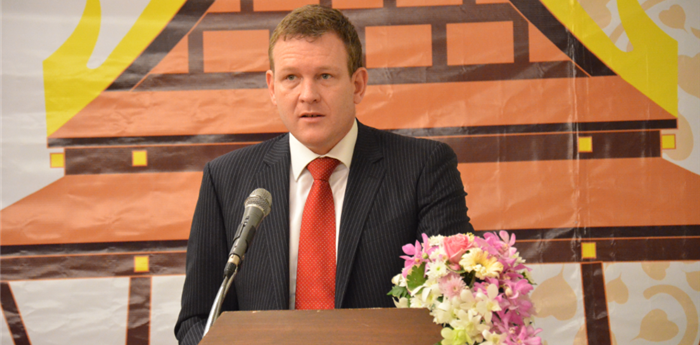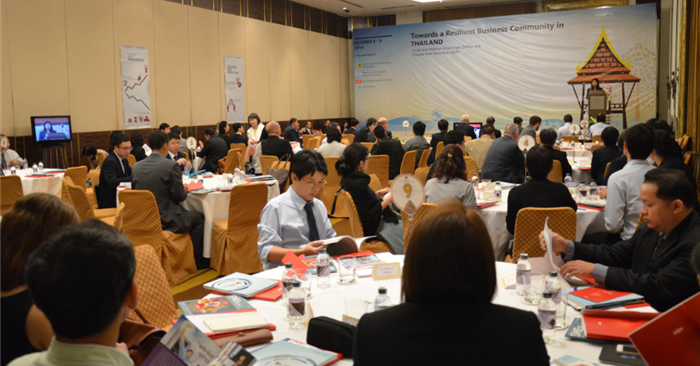- About Us
-
Who we are
-
- Publications
-
- ADPC Academy
-
MediaADPC'S NEWS
Promoting resiliency in SMEs to preserve economy and community Promoting resiliency in SMEs to preserve economy and community
16 Oct 2014
Bangkok, Thailand
“The private sector is the engine which drives the economy,” stated Mr. Shane Wright, Executive Director of the Asian Disaster Preparedness Center, in his welcome speech at the high-level policy dialogue titled Towards a Resilient Business Community: Small and Medium Enterprises (SMEs) and Disaster Risk Reduction.
SMEs represent 99% of the private sector in Thailand. There is a direct correlation between the economy’s ability to recover and the resiliency of these enterprises against the effects of disasters.
“It’s not just a question of economy it's a question of community. SMEs are important for the continuation of daily life. SMEs keep parents going to work to earn income so that they can support their families,” says H.E. Mr. Reuben Levermore, Ambassador of New Zealand to Thailand.
It is important that SMEs invest in activities that improve disaster preparedness. These activities may include developing business continuity plans, practicing these plans frequently, and investing in insurance.
“Building resilience means we need to invest. It is cheaper to prepare for disasters than to bare the consequences of ill preparation during recovery,” states Mr. Cherdkiat Atthakor, Deputy Director-General at the Department of International Organizations in Thailand.Unfortunately, private sector SMEs are among the most vulnerable to disasters. Many do not have the means to invest in technologies to reduce the consequences of disasters before they strike, or the resources to recover after a disaster.
A cooperative effort by both the private sector and the public sector to promote and support SME resiliency will be the solution to this problem. Towards a Resilient Business Community: SMEs and Disaster Risk Reduction aims to do just that.
“Today’s event is an excellent opportunity to promote public and private sector engagement in order to promote resilience,” Dr. Wimonkarn Kosumas, Acting Director-General of the Office of Small and Medium Enterprises (OSMEP), states.
Learning from the dialogue. The way forward for the private sector
In the dialogue section of the event, distinguished participants discussed the opportunities for the private sector within the context of the Post-2015 framework for disaster risk reduction. Participants agreed that disasters are not issues confined to the borders of one country, nor are they issues that must be addressed solely by the public sector or civil society.
“Less people are dying, however, economic losses are going up,” states Ms. Brigitte Leoni from UNISDR, indicating an increase trend of loss from disaster.
“Disasters are here to stay. They are increasing in terms of scope and scale. We need to invest more in mitigation and disaster risk prevention. It is about investing to protect your business,” states Ms. Urawadee Sriphiromya from the Thai Ministry of Foreign Affairs.
Yet businesses do not operate individually. In an increasingly globalized world, businesses are linked through international supply chains, which people rely on to carry out their business. As demonstrated in the 2011 floods in Thailand, losses suffered by automotive part manufacturers in Thailand created devastating losses for the Japanese automotive industry.
“Don’t think of yourself in isolation, because that is a recipe for disaster,” warns Dr. Thavirap Tantiwongse of GlaxoSmithKline.
All around the world the private sector must work together with the public sector and civil society to ensure disaster resilience. With the World Conference on Disaster Risk Reduction in Sendai approaching, there has never been a better opportunity for this to happen on a global scale. The second Hyogo Framework for Action which is being drafted at the World Conference should reflect an approach that aims to strengthen cooperation between these three global actors in disaster risk reduction.
Towards a Resilient Business Community: SMEs and Disaster Risk Reduction is a two-day high-level dialogue organized by ADPC in cooperation with OSMEP and the Department of Disaster Prevention and Mitigation of Thailand. The dialogue is supported by the JTI Foundation.Latest NewsRelated Trainings
-